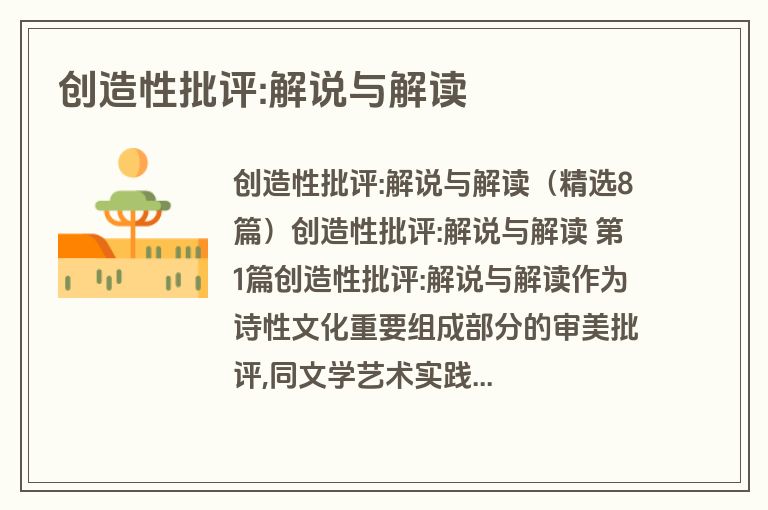初中英语常用介词用法练习题答案(精选7篇)
初中英语常用介词用法练习题答案 第1篇
飞跃英语常用介词练习
1.The play begins at 6: 40 pm.So we have to be at the theatre ____ 6:30 pm at the latest.A.after
B.around
C.until
D.by 1.D。从“戏剧在下午6:40开始”可知到达剧院的时间最迟不应晚于6:30。A项表示“下午6:30后到剧院”,C项表示“在剧院呆到下午6:30为止”,均不合题意。B项干扰性最强,around意为“左右,大约”, 但在6:30 pm后有at the latest“最晚”,二者相矛盾。C项by是not later than(不迟于)之意,整合题意。
2.They held a ceremony ________ those killed in the battle.A.in honor of
B.instead of
C.in favor of
D.by means of 2.A。in honour of意为“为庆祝(为向...表示敬意,为纪念”;instead of意为“代替;而不是”;in favor of意为“赞成;支持”;by means of意为“通过;用;借助于”。根据句意“他们举行了纪念阵亡战士的仪式”可知答案为A(from )。
3.After finishing middle school, my sister did nothing ________ at home.A.but to read
B.but read
C.besides reading
D.except to read 3.B。but, except 和besides都有“除„之外”的意思,但没有”,相当于not including.另外,but后面可接不定式to do,但如果but前面有实义动词dbesides是“除„之外,还”的意思,等于in addition to;而except, but 是“除„之外,o的任何形式,不定式省略to。
4.Write your name and address on your bag ________ you lose it.A.in any case
B.in case
C.in no case
D.in that case 4.B。in any case意为“在任何情况下”;in case意为“以防万一,如果”;in no case意为“决不”;in that case意为“如果那样的话”。句意为“在你的包上写上名字和地址以防丢失”。
5.— ________ did the professor give you much advice?
— The choice of a career.A.On what
B.In what
C.What
D.For what
5.A。“教授给你提的什么建议?”“择业”。“关于„的建议”应用介词on。
6.I made coat ______ my own hands.It was made ______ hand not with a machine.A.in;in
B.in;with
C.with;by
D.with;with
6.C。by hand意为“用手工”;with“用”, 表示使用的工具, 手段,如He hit it with a hammer.7.He is running ________ the wind towards the east of the station ________ Tom running ________ the right.A.down;and;on
B.against;with;on
C.for;with;in
D.with;while;to 7.B。against the wind“逆风”;on the right意为“在后边”;介词with与一个复合结构构成短语,用作状语,说明状态、方式等。
8.Not all of us know the difference ________ wheat, oats and barley.A.among
B.between
C.from
D.in
8.B。一般说来,between用于两者之间,among表示三者和三者以上之间。但有时说的虽然是三个以上的人或东西,如果强调的是两两相互间的关系,适用于between.如:The soldier is hidden between the trees.在谈论事物间的差别时总是用between.9.The young singer is quite popular ________ the public.She’s made a remarkable achievement ________ a girl of her age.A.with;to
B.to;for
C.with;for
D.for;to 9.C。词组be popular with意为“受„欢迎”,for“就„而论,比较„而言”。
10.The apple trees have lots of big apples __ them.And some birds are singing __ the trees.A.in;on
B.at;in
C.on;in
D.with;through 10.C。介词on意为“在„之上,依附于”;in意为“(表场所,位置)在„„之内 / 上”in the tree 译为“在树上”。
11.That woman will quarrel ________ everybody ________ anything.A.about;about
B.about;with
C.with;about
11.C。quarrel with sb.about / over意为“和某人争论某事”。句意为“那个女人无论碰到什么事儿, 总是和别人争吵不休”。
12.The weather this month has been good ________.A.on the whole
B.generally speaking
C.above all
D.on one hand 12.A。on the whole意为“总的来说;从总体上看”;generally speaking“一般说来”;above all意为“首先,最重要的”;on one hand意为“一方面”。句意为“这个月的天气基本上是好的”(from )。
13.We should divide all the potatoes ________ two piles and separated the good ones ________ the bad ones.A.from;by
B.into;from
C.into;into
D.from;into 13.B。divide„into和separate„from都有“把„„分开”的意思。但前者指“把整体分成若干部分”,后者指“把连在一起的分开”。
14.They said the building would be completed ________ a year.A.after
B.for
C.in
D.about 14.C。in, after这两个介词都可以用来表达“在若干时间之后”。in 可以用于将来时态或一般过去时态的句子中;after 用于一般过去时,如果表示某时刻之后或某件事之后,则不受时态的限制。
15.— These boxes are too heavy for me to carry.— Here, I’ll give you a hand ________ them.A.for
B.to
C.with
D.by 15.C。答语中的them指前一句的boxes。Give sb.a hand with sth./ in(at)doing sth.意为“帮助某人做某事”。
初中英语常用介词用法练习题答案 第2篇
介词的定义
介词是一种虚词,不能独立充当句子成分,需与动词、形容词和名词搭配,才能在句子中充当成分。
介词是用于名词或代词之前,表示词与词之间关系的词类,介词常与动词、形容词和名词搭配表示不同意义。
介词短语中介词后接名词、代词或可以替代名词的词(如:动名词v-ing).介词后的代词永远为宾格形式。
介词的分类
一、表示时间的介词
(一)表示时间段的介词
(1)in , after
in +时间段,表示从现在起往后推算一段时间
after +时间段,表示过去某时间往后推算一段时间,如:
He’ll come back in two days. 但点钟用after( after three o’clock)
He left on July 2 and returned after three days.
(2)in , during
表示在一段特指的时间内,可用in 或during
The work was done in / during the holidays.
表示年份、月份、季节用in , 如:in ,in June , in winter
(3)in last, for the past + 时间段, during
表示在最近一段时间内,句中谓语动词常用现在完成时
I have been in Shanghai in the last few years.
(4)for 表示延续一段时间。
I’ll study in the U.S for two years
I’ve waited for Bingo for half an hour.
(二)表示某一时间的介词
(1)at, on
at 表示某一时刻,on 表示某一天或日期, 如:
at 7:14, on Saturday morning on the night of May2
一天内各段时间表达, 选用正确的介词,请比较:
in the morning
on a winter / snow / cold / morning
at night
on the night of March 7th
in the evening
on Friday evening
(2)before, by
before 表示某一时间之前,而by 表示到某一时间止,句中谓语动词多用完成时态。如::You must get up before six. 你必须六点之前起床。
By the end of last month the boy had got 4 “As”.
到上月底这个男孩已得了4个A.
(3)after , since
after 可以表示过去某一点时间之后,并不延续说话时间,和一般过去连用,而since表示从过去某时间开始的一段时间延续到说话时间, 与现在完时连用 如;
My father lived in Shanghai after liberation .
解放后我父亲住在上海.
Since the end of last year the lady has given five concerts.
自去年年底以来,这位女士开了五十场音乐会
(4)fromto, until / till
from----to表示从某一点时间到另一点时间的一段时间,而until till 表示某动作或状态延续到某点时间如:
My mother studied in Beijing University from 1960 to 1964.
从1960年到1964年我妈妈在北京大学学习。
My mother entered Beijing University in 1960, and studied there until 1964.
我妈妈1960年进入北京大学,一直学习到1964年。(但“从早到晚”常表达为from morning till night)
(三)不用介词表示时间的词或词组
含this, that, last, next 的表示时间的名词词组,以及某些时间的副词或名词词组前不用介词,如:this year last summer, yesterday , the day after tomorrow 等。
二、表示事物之间位置的介词
(1)at, in
当事物被视作一点,不强调其空间常用介词at, 而表示空间内部用介词in, 如:
We’ll meet at the supermarket 我们在超市见面
I had to stay in the supermarket as it was raining hard
因为下大雨,我只好呆在超市里
动词arrive 后接at ,表示较小的地方, 如: 车站、村庄等.后接in 表示较大地方,如: 城市,地区等
(2)in, to
in 表示事物在区域范围内的位置,to 表示事物对区域范围之外另一事物的位置,如:
Shanghai is in the east of China. 上海在中国东部
Japan lies to the east of China. 日本位于中国东面。
in front of 表示在前面,一般不在范围内,in the front of 表示在前面.在同一范围内。
(3)after, behind
after 指顺序先后 ,behind 指位置在某事物之后,相对于in front of 而言, 如:
He entered the classroom after the teacher
He hid himself behind the door 他在门后。
(4)on , in
on 表示“在某事物表面上”。如将事物看作空间,表示在其内部,用介词in。
There is a modern painting on the wall .
There is a modern painting on the wall .
(5)from , off 都表示“离开”
(6)above , over, below , under
over , under 表示垂直的上下关系,而above, below 仅表示位置上“高于”或“低于”, 不表示垂直关系。
(7)between, among
between 表示“两个事物之间”, among 表示“三者以上的事物之间”。
三、表示运动方向的介词
(1)into, inside , in 从外到内 如:
He went quickly into / inside the room.
He went quickly into / inside the room.
(2)out of 从里到外,相当于outside, 或从里向外,相当于from
She went out of from the office in a hurry 她匆匆走出办公室.
The boy watched the buses, cars and bikes out from the window .
这男孩透过窗观看外面的公交车、小汽车和自行车。
(3)on 在表面,onto 到上
A boat is on the river. 一条小船在河上。
He jumped onto a tree. 他跳上一棵树
(4)across 穿过一平面、through 穿过一空间
The boy kicked the ball hard and it moved across the grass.
这男孩用力踢球,球飞过草地。
The train moved fast through the tunnel. 火车飞驶隧道。
(5)The train moved fast through the tunnel. 火车飞驶隧道。
She walked to the bank 她步行到银行去
She swam towards the shore 她朝岸边游去。
四、常用介词用法比较
(1)as , like
as 表示“作为”强调身份,like (介词)表示“像”
As a teacher, he cares for these children.
Like a teacher, he cares for these children.
(2)with , in
with 表示“外貌特征或附带的东西” ,“ 用作工具”
in 表示”衣着” ”用某语言”, 在固定搭配中也可用in
A man with dark glasses wanted to buy drinks.
A man in black wanted to buy drinks.
The boy is learning to write in pencil / with a pencil.
He retold the text in English.
(3)for , to
for表示“为了.”
To 表示动作对象, “对, 向.” 如:
He would do anything for his motherland.
Did you mention this to my father?
你对我父亲提起过这件事吗?
for 表示“就某情况而说 ”, to 表示一“对某对象而言”如:
It’s quite warm today for February.就二月的天气,今天够暖和的。
What he told you just now was not new to me
他刚才对你所说的话对我并不新鲜
for 表示“目的,用途”。与go, come动词连用,
(4)except , besides
except 表示“从总体中排除一部分”, 与bat 同义, besides 表示“除了一部分还有另一部分”
We all failed except him. 我们都失败了,但他没有。
He speaks German besides French.他懂法外还会讲英语。
(5)注意成对介词的用法:
get into (out of ) the car, get on (off) the bus, jump onto (off) the platform, out of
(6)介词和名词动词等有不少固定搭配和习惯用法:
to one’s surprise / joy, in charge of , instead of, in bed (hospital), in trouble, in a hurry, in surprise, with a smile, with one voice, according to, at once, on time, in time, in all, at home, (school, work), at last, at least, in the end, by the way, for example, at the same time, at the same speed, on one’s way (to), in the sun, on the football team, in line, with the help of, in red / green put on, look for, look after, run after, send for, enter for, pay for, showaround, listen to, arrive in / at, get to, agree with, succeed in, think of (about), wait for,.
(7)表示加减乘除,分别用介词plus, minus, times 和动词过去分词divided + by
复习时需要注意的要点
(1) 介词一般放在名词之前,但它后面的介词宾语是疑问代词、疑问副词或者关系代词时,这些词提到了前面而只剩下介词在后了。
(2) 介词和动词、形容词、名词等常常构成固定搭配,也就是说,在这些词的后面常常要求用一定的介词。这一点在学习时要特别注意。如:
a.动词+介词:laugh at, wait for
b.形容词、过去分词+介词:be good at, be prond of
c. 名词+介词:pay a visit to , the key to
介词的实战演练
例1 We will play football three o’clock.
A. In B. After
C. To D. since
答案: B
提示: 这四个选项的介词都可以表示时间,但含义和用法不同。in常用来表示以现在为起点的将来一段时间之后,after?可表示从过去为起点的一段时间之后,通常与过去时连用。但要注意after?也可以表示将来某一特定时刻之后。本题里after表示将来某一特定时刻。
例2 The story took place a cold night.
A. in B. after
C. to D. since
答案: B
提示: on通常指特定时期:或表示某一天的上午,下午,晚上等。句中的时间状语a cold night已表明在某个寒冷的夜晚,其前面应使用介词on。
例3 We will play football three o’clock.
A. In B. After
C. To D. since
答案: B
提示: 这四个选项的介词都可以表示时间,但含义和用法不同。in常用来表示以现在为起点的将来一段时间之后,after?可表示从过去为起点的一段时间之后,通常与过去时连用。但要注意after?也可以表示将来某一特定时刻之后。本题里after表示将来某一特定时刻。
例4 The story took place a cold night.
A. in B. after
C. to D. since
答案: B
提示: on通常指特定时期:或表示某一天的上午,下午,晚上等。句中的时间状语a cold night已表明在某个寒冷的夜晚,其前面应使用介词on。
例5 This is the bus the People’s Park.
A. at B. for
C. to D. towards
答案: B
提示: 四个选项的介词表达的意义不同。at表示“在某处,在旁边”,for表示“(动身)去处”,to表示“到某处”,towards表示“向某处”。
例6 Are your parents workers?
No, is a worker.
A. neither B. none
C. either D. both
答案: A
提示: neither是对两个人或事物的否定,谓语用单数形式;而both则是对两个人或事物的肯定,谓语用复数形式。
例7 The work cost us more than five weeks.(保持原意)
more than five weeks the work.
答案: We spent, on
提示: cost表示花费时间,只能用表示事物的词作主语,而spend也表示花费时句子主语必须是人。注意spendon,表示在某事上花费。
例8 Beijing has a lot of old buildings. It also has a lot of new ones.(合并一句)
答案: Beijing has not only a lot of old buildings but also a lot of new ones
提示: 这道题主要掌握表示递进关系的连词词组。
例9 My brother likes skating.I like swimming.(合并一句)
答案: My brother likes skating but I like swimming.
提示: 这道题的两个句子主语不是同一个人,谓语动词之后的部分也不同,实际上是把喜欢的内容由一个方面转到另一个方面,所以用but把两个句子连接起来。
例10 He is too young to join the army.(改复合句)
答案: He is so young that he can’t join the army.
提示: so...that表示否定时可与tooto转换。
例11 There is a hole the wall.
A. in B. on
C. of D. with
答案: A
提示: 在墙的里面,用in the wall,而on the wall指在墙的表面上。
例12 English names are different Chinese names.
A. between B. of
C. from D. about
答案: C
提示: be different from表示“与不同”,是一个固定词组。
例13 We always have a class meeting Monday afternoon.
A. at B. on
C. in D. of
答案: B
提示: 在某天的上午下午或晚上,介词应使用0n。
例14 Please write it ink
A. with B. in
C. by D. of
答案: B
提示: 如果表示用墨水写该用in,不能用with。
例15 I’ll return the book to the library I finish reading it
A. when B. if
C. as soon as D. as
答案: C
初中英语介词用法小结 第3篇
介词主要是用来表示它后面的名词或代词与句中其他某个成分之间的关系。不能独立充当句子成分,必须与后面的宾语构成介词短语后才能做句子成分。
一.介词(短语)语法功能
1.作状语
介词(短语)在句子作状语修饰动词。表示“时间”,‘‘地点”,‘‘条件”,‘‘方式”或‘‘目的”等。
例如:①She gets up at 6:30 in the morning every day.(表时间)
②There are some books on the desk.(表地点)
③People can’t live without air or water.(表条件)
2.作定语介词短语作定语表示某个关系,一般放在它所修饰的名词或代词之后。例如 The girl in the red skirt is Lucy.(后置定语)
3.作表语
介词短语作表语时,多放在be 动词之后。
例如:① She is in the next room.② He is from English.二.常用介词的用法
1.表示时间的介词
①in,on,at.in 表示世纪,年,周,季节,在上午∕下午∕晚上∕白天等。
例如:in the morningin Mayin 2012in his fortiesin an hour
on 表示确定的时间,某日,某日的上午,下午,晚上,星期几,或一般节日等。
例如:on Sundayon a rainy eveningon May 4on the night of May 4on Teachers’
Dayon Children’s Day
at 用于表示时间“点”.夜里.中午及某些词组中
例如.at 4 o’clockat noonat that timeat the end ofat the age of②by ,until∕till
表示期限时通常用介词by ,until ∕till
by表示“不迟于”,“在 ……之前”
例如:They had seen four English films by the end of last night.Until ∕till到……为止
在肯定句中谓语动词要用延续性动词。
例如: Iwaited for my mum until she came home.在否定句中,not … until译成“直到……才”谓语动词用非延续性动词。
例如:I didn’t go to bed until my mum came home.③in ,for ,during ,through
1)in 表示“在。。。时间内”“在。。。时间后”
例如 :Do you work in the day time or at night ?
I hear he’ll be back in a week.2)for 后接一段时间,可与多种时态连用,如与现在完成时连用,谓语动词只能用延续性动词。
例如:She has worked there for 8 years.3)during表示“在。。。期间”,强调“自始自终”.例如:
4)through =from beginning to end“自始自终”“从头到尾 ”
例如:Dr.Bethune went on working through the night.注:对“in+时间段”提问用how soon
对“for+ 时间段”提问用 how long
On the+身体硬部位
in the +身体软部位
④表示时间的起点用since 或from
例如:Tom has worked in the factory since three years ago.From now on ,I will learn English in the morning.⑤in 和after
1)in “在。。。以后”从现在算起,后接时间段,常用于将来时。
例如:We’ll be back in a week.He’ll arrive at Shanghai2)after “在。。。以后”,从过去算起,后接时间段,常用于过去时。
例如:They got there after 8 hours.后接时间点,常用于将来时。
例如:The plane is leaving after nine.2.表示地点.位置的介词
①inontoat
in 在某一范围之内。
例如:Shanghai lies in the east of China.on 表示两个不同的个体相邻或接壤。
例如:Hefei lies on the south of Huainan.to表示两个个体间有一段距离或隔海相望。
例如:Japan is to the east of China.At表示在街道或城镇。
例如: He lives at 158 JianguoStreet.②inat
in后跟较大地方
例如:He lived in China three years ago.at 后接较小地方
例如:We waited at the gate of the school.③aboveoveron
Above表示位置高于某物不接触,在其上方任意一点,但不是正上方。其反义词是below例如:The moon is now above the trees in the east.Over 指正上方,垂直方向。其反义词是under
例如:There is a bridge over the river.On 在。。。上面,相互接触。
例如:There is a pen on the desk.特殊用法:on在树上<本身具有> There are some apples on the tree.in在树上< 外来物> There are some birds in the tree.3表示方向的介词:bywithin
by后跟动名词或抽象化的可数名词(其前不用冠词)意为“用„„手段或方法” 例如: He goes to school by bus every day.The old man had to make money by selling vegetables.with表示用工具,借助于某一具体的手段,工具,材料或人体器官。
例如:People here build houses with stones.With the help of my teacher ,I did well in my English.We see with our eyes.in 用材料.语言.声音等媒介,以„„方式.What is this in English ? She said in a loud voice.He wrote the words in red ink.4.to 的两种用法的区别
① to+v.(不定式)
例如:to do sth
② to+v-ing(介词)
例如:look fordward to doing sth
get /be used to doing sth
pay attention todoing sth
make a contribution to doing sth
prefer doing sthto doing sth
6.时间状语前不用介词的情况。
当morning等词前有this ,that ,next ,last 等词修饰时,介词须省去。下列介词须省去:
修饰语中心词
① this /thatmorning/week /year/January/spring② next /lastSunday /week /term/year/spring/May③ tomorrow/yesterday/lastmorning/afternoon/evening
④ the dayafter tomorrow /before yesterday
初中介词英语用法总结 第4篇
1. in 表示在某地范围之内。
如: Shanghai is/lies in the east of China.
上海在中国的东部。
2. to 表示在某地范围之外。
如: Japan is/lies to the east of China.
日本位于中国的东面。
3. on 表示与某地相邻或接壤。
如: Mongolia is/lies on the north of China.
蒙古国位于中国北边。
♥表示计量的介词:at, for, by
1. at表示“以速度”“以价格”。
如: It flies at about 900 kilometers a hour.
它以每小时900公里的速度飞行。
I sold my car at a high price.
我以高价出售了我的汽车。
2. for表示“用交换,以为代价”。
如: He sold his car for 500 dollars.
他以五百元把车卖了。
注意:at表示单价(price) ,for表示总钱数。
3. by表示“以计”,后跟度量单位。
如: They paid him by the month.
他们按月给他计酬。
Here eggs are sold by weight.
在这里鸡蛋是按重量卖的。
♥表示材料的介词:of, from, in
1. of成品仍可看出原料。
如: This box is made of paper.
这个盒子是纸做的。
2. from成品已看不出原料。
如: Wine is made from grapes.
葡萄酒是葡萄酿成的。
3. in表示用某种材料或语言。
如: Please fill in the form in pencil first.
请先用铅笔填写这个表格。
They talk in English.
他们用英语交谈。
注意: in指用材料,不用冠词;而with指用工具,要用冠词。
请比较: draw in pencil 与draw with a pencil.
♥表示工具或手段的介词:by, with, on
1. by用某种方式,多用于交通。
如:by bus 乘公共汽车
by e-mail. 通过电子邮件
注意: 表示搭乘交通工具时,用by时不用冠词,用in时要用冠词。
请比较: I went there by bus/in a bus.
我是坐公共汽车去的那儿。
2. with表示“用某种工具”。
如:He broke the window with a stone.
他用石头把玻璃砸坏了。
注意: with表示用某种工具时,必须用冠词或物主代词。
3. on表示“以方式”,多用于固定词组。
如:They talked on the telephone.
他们通过电话进行交谈。
She learns English on the radio/on TV.
她通过收音机/电视学英语。
♥表示关于的介词:of , about,on
1. of仅是提到或谈到过某人或某事。
如: He spoke of the film the other day.
他前几天提到了这部影片。
He thought about this matter yesterday.
他昨天考虑了这件事。
2. about指“关于”某人或某事物的较详细的情况。
如: Can you tell me something about yourself?
你能告诉我一些关于你自己的事情吗?
3. on指“关于”学术性的或严肃的事。
如: It’s a textbook on the history of china.
它是一本有关中国历史的教科书。
♥表原因或理由的介词:for, at,from,of, with, by,because of
1. for表示原因,常与sorry,famous, punish, praise, thank, blame等词连用。
如: I am sorry for what I said to you.
我后悔不该对你讲那些话。
2. at指情感变化的原因,意为“因听到或看到而”。
如: He was surprised at the news.
听到这消息他大吃一惊。
3. from指“外在的原因”,如受伤、车祸等。
如: He died from the wound.
他因受伤而致死。
4. of指“内在的原因”,如病、饿等。
如: The old man died of hunger.
老人死于饥饿。
5. with指生理上或情感上的由外界到内心的原因。
如: Hearing the news, he jumped with joy.
他们听到这个消息,欣喜若狂。
He was shaking with anger.
他气得浑身发抖。
6. by表示外部的,尤其是暴力的或无意中造成某种结果的原因。
如:Her body was bent by age.
他因年老背弯了。
She took your umbrella by mistake.
我因弄错拿了你的雨伞。
7. because of 表示引起结果的直接原因。
如: He retired last month because of illness/because he ill.
他上个月因病退休了!
8. owing to多表示引起某不良后果的原因。
如: Owing to the rain they could not come.
由于下雨他们没来。
9. thanks to表示引起某种幸运结果的原因,常译为“幸亏,多亏”。
如: Thanks to John, we won the game.
多亏约翰,我们才赢了这场比赛。
10. out of表示动机的起因,常译为“出于”。
如: He asked the question out of curiosity.
他出于好奇才问了那个问题。
11. through多表示因局部而影响全局的原因。
如: The war was lost through bad organization.
战争因组织不周而失败了。
♥表示好像或当作的介词:like, as
1. like表示“像一样”,其实不是。
如: Peter the Great, like his country, was strong and proud.
彼得大帝像他的国家一样强健和自豪。
2. as表示“作为,以身份”,其实也是。
如:He talked to me as a father.
他以父亲的身份跟我谈话。
注: as作连词时,可表示“好像”。
如:The work is not so difficult as you imagine.
这工作不像你想像的那么困难。
♥表示支持或反对的介词:against,for
against反对,for支持,互为反义词。
如: Are you for my idea or against it?
你赞同还是反对我的想法?
表示除某人某物外的介词:besides, except
1. besides是包括后面所提人或物在内的“除外,还”。
如: Thirty students went to the cinema besides him.
除他以外,还有30个学生去看了电影。(他和另外30人都去了)
He is interested in tennis besides(=as wellas)football.
除了足球,他还对网球感兴趣。
2. except是指不包括后面所提人或物在内的“除去”。
如: Everyone is excited except me.
除我以外的每个人都很激动。(他们激动,而我却不激动)
All the visitors are Japanese except him.
除他以外的所有游客都是日本人。(其他人是日本人,可他不是)
注意:
(A) except通常与表示全体的all, every连用;若与other连用,只能用besides。
如: He had other people to take care of besides me.
除我之外,他还要照顾别人。
(B) except是排除同类;而except for是排除非同类,常在说明基本情况后,从细节上加上修正。
如: The composition is very good except for a few spelling mistakes.
除了几处拼写错误之外,这篇作文整体还是不错的。(作文与拼写错误是非同类的)
但except for也可代替except,特别是在句首时,因为except是不能用于句首的。
如: Except George, you can all go.
中学常用介词用法-5 第5篇
1.动词+to
a)动词+ to。介词to意为“达到,指向”等:adjust to适应, attend to处理;照料, agree to赞同, amount to加起来达,belong to属于, come to达到, drink to为干杯,get to到达, happen to发生在某人身上, hold to紧握, lead to通向, listen to听, occur to想起, object to反对, point to指向, respond to回答, refer to参考;指的是;涉及, reply to回答, see to负责,stick to坚持, turn to求助, write to给某人写信。例如:
She must learn to adjust herself to English life. 她必须学会适应英国的生活。
Business has to be attended to. 有事要办。
An idea occurred to me. 我想出一个办法。
b)动词(+sth.)+to+sb.。下列动词不能直接带间接宾语sb.,要接间接宾语时须在动词后加介词to:announce to通知某人, describe to向某人描述, explain to向某人解释, express to对某人表达, mention to提及, nod to向某人点头, report to报告, say to告知, shout to对某人大叫, suggest to对某人提建议,speak to与某人交谈, talk to跟某人谈话, whisper to和某人低声耳语。例如:
She suggested to me one or two suitable people for the committee.她跟我向委员会推举了一两个合适的人选。
c)动词+sth./sb.+ to +sth./sb.。此时介词to可译成“到,于,给”等意思:add to增加, compare to比作, carry to运送至, devote to致力于,introduce to介绍给, invite to邀请参加, join to连接到, leave to委托给,reduce to下降至, sentence to判处, take to带到。例如:
Please add a piece of candy to coffee. 请给咖啡加块糖。
Poets like to compare life to stage. 诗人喜欢把人生比作舞台。
2. be +形容词/过去分词+ to。to的意思是“对”:be alive to觉察;晓得,be attentive to注意;留心, be awake to知晓, be blind to缺乏眼光,be close to紧挨着, be common to对某人来说很普通, be contrary to违反;反对, be devoted to致力, be deaf to不愿意听, be equal to有的力量,be exposed to暴露;遭受, be fair to对公平, be familiar to对某人来说熟悉,be grateful to对某人心存感激, be good to对有好处, be harmful to对有危害,be important to对重要, be kind to友好对待, be known to周知于,be married to嫁给, be moved to转移到, be near to靠近,be necessary to对有必要, be opposite to在对面, be opposed to反对,be pleasant to合某人之意, be proper to专属, be polite to礼貌待人,be rude to粗暴对待, be relative to与有关, be strange to不习惯,be similar to类似, be suitable to适合, be true to忠实,be thankful to感激, be useful to对有用, be used to习惯。例如:
Are you alive to what is going on? 你注意到发生什么事了吗?
The old man was not equal to the situation. 那老人不能应付这种情况。
His house is opposite to mine. 他的房子在我的房子对面。
中学常用介词用法-3 第6篇
1.动词+from
a)动词+ from。from表示“来源、原因、起始”等:come from来自,date from追溯, depart from违背, die from死于, escape from逃出,fall from自跌落, hang from垂挂, hear from收到来信,learn from向某人学习, return from自某地返回,rise from自冒出, result from起因于, suffer from忍受。例如:
All the characters in the book are drawn from real life.书中所有的人物都来自于真实的生活。
Any damage resulting from negligence must be paid for by the borrower. 因疏忽引起的任何损坏都应由借用者负责赔偿。
He has recovered from his surprise. 他好不容易回过神来。
b)动词+ sth./sb. +from + sth./ sb. /a place。from表示“来源、免于”等:borrow from向借, choose from选自, excuse from免除, keep from阻止做,prevent from不准做, protect from不受之害, receive from收到,remove from移动;除去, save from保全;拯救, separate from分离开来,stop from阻止。例如:
He was excused from attendance at the lecture. 他获准可不去听课。
Stop the child from spoiling the book. 不要让孩子弄坏了书。
2. be +形容词+ from。此时from含义众多:be absent from缺席,be different from与众不同, be far from更不用说, be hidden from躲避,be made from用制成, be tired from因而疲倦。例如:
The boy can’t walk and is far from running.那男孩不会走路,更不用说跑了。
3.fromto。本短语表示从一种状态到另一状态的变化或从到:from bad to worse每况愈下,from beginning to end自始至终,from cover to cover从头到尾,from China to Peru到处,from day to day一天一天地,from door to door挨家挨户,from end to end从头至尾,from first to last自始至终,from hand to mouth勉强糊冢琭rom head to foot从头到脚,from mouth to mouth广泛流传,from sun to sun从日出到日落,from start to finish从头开始,from top to toe从头到脚,from time to time不时地,from top to bottom彻底地。
六、IN
1.动词+in
a)动词+ in。in在短语中的含义异常丰富:believe in信任, break in碎成,bring in引起;产生;带来, call in下令收回, fill in填充,get in收获, hand in上缴, involve in涉及, lie in在于, result in导致, share in共享,succeed in成功, take in卷起;订阅, turn in归还当局。例如:
He was so short of money that he had to call in the loans that he had made. 他很缺乏资金,不得不收回所有的款子。
Your failure lies in your laziness. 你失败的原因在于懒惰。
Orders are given to take in sail.已发布收帆的命令。
b)动词+sb./time/money+ in。介词in后接(doing)sth.:help sb. in帮助某人做某事, spare time/money in匀出时间或钱做某事,spend time/money in花时间或钱做某事,waste time/money in浪费时间或钱做某事。例如:
She offered to help him in the housekeeping when I am not here.她提出,我不在家时她可以帮助他料理家务。
2. be +形容词+ in。in表示“在某些方面或穿着”:be active in活跃于,be absorbed in专心致志, be busy in忙碌, be born in出生于,be concerned in牵涉, be clothed in穿着, be disappointed in对失望,be diligent in勤于, be experienced in在有经验, be employed in任职于,be engaged in忙碌, be expert in某方面的专家, be excellent in在优秀,be interested in对有兴趣, be lacking in缺乏, be rich in富有,be slow in迟缓, be successful in在某方面成功, be skilled in精于,be strict in严于, be weak in弱于。例如:
She was completely absorbed in her own affairs. 她完全专注于自己的事务。
More than one person has been concerned in this. 不只一人牵涉到这件事。
3. in +名词。 in表示“处于某种状态或在某些方面”等意思:in advance提前,in all总共,in balance总而言之,in bed卧床,in body亲自,in brief简明扼要,in case万一, in charge主管,in danger有危险, in debt负债, in despair失望,in force大量地;有效,in full全部地, in flower开花,in general一般说来,in itself本身, in love恋爱, in order井然有序, in person亲自,in public公开地, in progress有进展, in practice从实践上看, in rags穿着破衣, in research探索, in return作为报答,in ruins一片废墟,in short总之,in theory从理论上看, in trouble有麻烦, in tears眼泪汪汪,in time及时, in turn按顺序, in vain白白地,in view看得见。
中学常用介词用法-1 第7篇
一、ABOUT
1.动词+about+sth.。about在此表示“论及,谈起,涉及,着手”等意思:
arrange about安排,argue about辩论, ask about询问,bring about带来,chat about闲聊,care about在意,complain about报怨,go about着手,hear about听说, inquire about打听,know about了解, quarrel about争论,read about读到, see about负责处理,set about开始, speak about谈起, talk about谈论, think about考虑, trouble about担心,tell about讲述,worry about着急。现举例说明其中一些短语的用法:
She inquired about my brother. 她向我打听有关我兄弟的情况。
I must set about my packing. 我必须开始收拾行装。
What are you chatting about? 你们在聊什么呢?
2. be +形容词+about+sth.。about在此意思是“为,对”,接表原因的词:
be anxious about为着急, be bad about对感到不舒服,be busy about忙于,be careful about小心, be certain about对有把握, be concerned about关心,be crazy about为发狂,be excited about为感到激动, be happy about为而高兴,be mad about为发疯,be nervous about对感到紧张, be particular about挑剔,be pleased about为兴奋,be strict about对严格,be thoughtful about对考虑周到的,be uneasy about为感受到不安。请看例句:
What have you been busy about today? 今天在忙些什么?
You are certainly very thoughtful about others. 你为别人想得太周到了。
I’m strict about such things. 对这些事我是很严格的。
注:come about发生,get about(疾病、谣言)流行,turn about转身,
leave about到处乱放,lie about随便堆放,put about打扰;传播,
put oneself about使发愁。这些词组中about作副词,此时about不能接宾语。
二、AFTER
1.动词+ after。介词after有“追赶,问候,效仿”之意:ask after问候, be after寻求,do(sth.)after学着做,go after设法得到, inquire after问候, look after寻找,run after追求, seek after追逐, take after长得像。例如:
Every afternoon he called to ask after his girl friend.他每天下午都打电话问候他的女朋友。
The boy takes after his father. 这男孩长得像他父亲。
The dogs went after the wounded deer. 一群狗在追赶那只受伤的鹿。
2.after构成的其它短语。after在不同的短语中意思各异:
after a little/moment/while过了一会,after all毕竟,after dark天黑以后,after one’s heart合的心, after school放学后, after service售后服务,after the fashion勉强, day after day日复一日,one after another一个接一个,year after year年复一年。例如:
Don’t be too strict with him. After all he is still a child.
不要太苛刻了,毕竟他还是个孩子。
He can speak and write English after a fashion.







